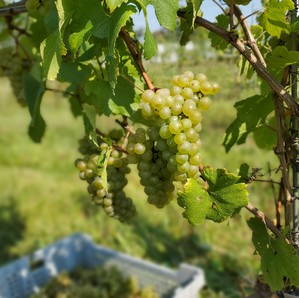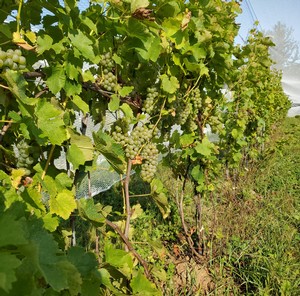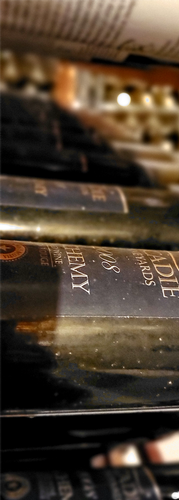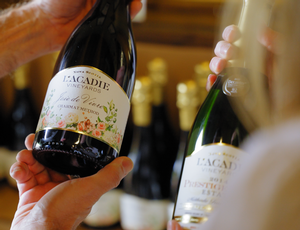L'Acadie Vineyards Blog
Welcome to the L'Acadie Vineyards blog and winery news
Grower sparkling wine - our model
Our provincial liquor store has many sparkling wine options from large companies such as from Champagne but rarely will you find a Grower Champagne – small scale producers preserving family farming traditions and growing the grapes that go into the bottle. Our grower sparkling winery in Gaspereau, Nova Scotia parallels these interesting French wines.
Large sparkling wine brands such as Veuve Clicquot, Moet and Mumm buy most of their grapes from contracted growers for large scale bottle production shipped around the world. This disconnect is the main difference with grower sparkling wines.
Terroir
You create a sense of place, or terroir, in a wine when you focus on a single vineyard. For example, grapes for our Prestige Brut Estate are always sourced from the same vineyard block with 20 cm topsoil over an ancient seabed- a unique composition of slate, schist and sandstone gravels. These wines have minerality and slight saline characters that international wine judges have identified and awarded. Grape growing is thus extremely important since grapes that we nurture are transparently showcased for judge and consumer approval.
Sustainability
We farm organically – we understand the quality stakes and we want to preserve our land for family succession. Our organic vineyard has been organic since inception 20 years ago and in 2021 we achieved another level of sustainability - certified Biocyclic Vegan, soil to glass. We grow grapes with cover crops for regenerative agriculture and living soils, plant-based teas and no animal manures, and encourage biodiversity. Organic wines express their terroir better than chemical dependent vineyards.
Recently disgorged
Disgorging is the last process of sparkling wine production to remove yeast from the bottle, add dosage (sweetened wine), insert the cork and wire cage, and get ready to release the new vintage. Bottles usually rest on cork for about a month to marry flavours with dosage before release. Large sparkling wineries distribute their bottles around the world and they sit on cork for several years developing a richer honeyed character. Smaller wineries have the ability to sell bottles direct with less time on cork. These recently disgorged bottles are sought after for their freshness.
Vintage Dated
Large sparkling wineries are well branded and marketed with elevated prices. People buy them for brand recognition. There is a consistent flavour profile by blending reserve wines that are held back from past years. These non-vintage wines differ from vintage-dated grower sparkling wines where the growing season is showcased, and celebrated. Much like how a single vineyard gives a sense of place with unique terroir, vintage dates reflect what Mother Nature offered during that growing season. Winemaking has to be in top form to harness these gifts by deciding on variables such as harvest dates, fermentation temperature, lees contact time and dosage levels added at disgorging for balance.
Matching style, variety and soil
20 years of style, variety and soil
This year marks 20 years since we drove across Canada from an established winemaking career in the Okanagan Valley, British Columbia to acquire our piece of paradise in Gaspereau, Nova Scotia. Fallow farm land ready for us to plant the province’s first organic vineyard, and our decisions on wine style and variety are standing the test of time.
Time honoured traditions of old world wine regions dictate suitable varieties and wine styles for individual appellations and sub appellations, usually evolving from trial and error of matching them to intrinsically unique soils and microclimates. We made an informed decision, some might call it bold, in 2004 by drawing upon years of sparkling winemaking experience in the Okanagan Valley that the 30 acres in Gaspereau would produce world class sparkling wine. Our palette: uniquely well-drained ancient seabed gravels covered with 15-30 cm loamy top soil tilted 5% towards north west. The industry mantra at that time was “south slope” but I had been making wine from different slopes for years – south for hot-loving reds, north and east for whites, and quite often struggled with grapes planned for sparkling wine production that were ripening too fast, losing fruitiness and freshness. The slope direction seemed like a good fit and it was the soil, schist, sandstone and slate that sealed the idea of suitability for sparkling wine. Wine flavours are influenced by climate and grape variety, and soil comes in a close third. We anticipated minerality nuances, a proven wine characteristic in great wines of the world, and international judges are noticing.
Decanter World Wine Awards 2018, London, England – 92 points, Silver Medal for 2013 Prestige Brut Estate
Judges’ notes, "A floral, apple nose with chalky lemon and creamy pear on the refreshing, mineral palate."
There was risk that the soil would not retain enough moisture compared to the typical rich clay-loam soils around us but even though the young vines struggled during establishment they grew deep roots for resilience to future climate extremes like drought. That coupled with our living soils encouraged with organic farming practice bodes well for climate change resilience. Roots are supported by colonies of fungus living symbiotically, helping water, nutrient....and flavour uptake.
Read more about Climate change resilience and organic farming
On our many visits to Nova Scotia to visit family before we moved back, we got to know the region’s signature grape variety, L’Acadie Blanc, and we’d talk long into the night about whether and how we could make it into a world-class sparkling wine. There wasn’t a bubble in the province at that time but we saw the potential – freshness, apple, citrus, moderate alcohol. Our second bold decision was initially planting 8 acres of exclusively L’Acadie Blanc for sparkling wine at a time when most of the region was planting multiple varieties for blending versatility and more selection of varietal wines. We foresaw traditional method sparkling wine to be the defining style for our region, in particular, L’Acadie Blanc cuvees.
There have been many milestones in the last 20 years that have proven our decisions,
- 2005 – established Nova Scotia’s first organic vineyard
- 2008 – opened sustainable winery with geothermal heating and cooling and insulated concrete construction
- 2008 – released Nova Scotia’s first traditional method sparkling
- 2008 – Nova Scotia’s first appassimento wines. First releases of Alchemy and Passito from our 5-year appassimento research project with Agriculture Canada and collaboration with Italian researchers.
- 2010 – gold and top scoring sparkling for 2007 Prestige Brut at 2010 National Wine Awards. A first for Nova Scotia.
- 2011 – silver medal for 2007 Prestige Brut at 2011 Effervescents du Monde (Dijon, France) First international sparkling award for Nova Scotia.
- 2015 – silver medal for 2010 Prestige Brut zero dosage at 2015 Effervescents du Monde.
- 2021 - Certified to European Biocyclic Vegan standard, the first farm and winery in North America. Read more about our vegan wines, Why we are Biocyclic Vegan
- 2023 – gold medal, 95 points for 2017 Prestige Brut Estate at 2023 Decanter World Wine Awards. First gold medal for Nova Scotia from Decanter, after earning many silver awards and 92-point designations for previous vintages.
2024 Harvest Summary
2024 Harvest Summary via Instagram
A harvest update from winemaker Bruce Ewert for our Gaspereau vineyard in Nova Scotia, Canada. Our estate winery near Wolfville makes certified Biocyclic Vegan and organic sparkling wines and this year we harvested Sauvignon Blanc for a Sancerre-style wine to be released in 2025.
2024 Harvest Update


Chardonnay and Sauvignon Blanc 2024 at L'Acadie Vineyards, Gaspereau, NS
Harvest 2024 is halfway done and quality and freshness are head turning! We started picking September 16, our earliest harvest ever, and it reminds me of 1998 in the Okanagan Valley when I was winemaker at See Ya Later Ranch winery. That was the earliest harvest for British Columbia wineries at that time too and marked beginning signs of climate change. Here at L'Acadie Vineyards near Wolfville we watch acidity (freshness) closely by sampling grape maturity leading up to harvesting vineyard blocks and have always maintained freshness for close to twenty vintages, the benefit of having our Nova Scotia winery in such an ideal cool climate for sparkling wine.
2024 marks a rebound year from the 2023 polar vortex in Nova Scotia. Pictured above is organic & Biocyclic Vegan Chardonnay and Sauvignon Blanc planted in 2019. These varieties are far more sensitive than other varieties that we grow at our Gaspereau vineyard, so harsh winter weather can have devastating effects. Last year and this year we meticulously trained new trunks and interplanted where vines had died. We are so excited and grateful to have a beautiful small-lot harvest from our estate Chardonnay, Sauvignon Blanc and Pinot Noir this year. 🍇✨
Growing grapes on the limits of cool climate viticulture can have risks such as winter damage, but rewards in quality can often surpass world wine standards. Fingers crossed this will be another award winning vintage!
Related blogs,
/blog/Vineyard-Update---Polar-Vortex-Impact
/blog/Update-from-the-Vineyard
~~~~~~~
Thanks for supporting farm wineries in Nova Scotia! These are challenging times with government and we appreciate your support. https://www.cbc.ca/news/canada/nova-scotia/wine-grape-growers-tim-houston-vineyards-1.7333355
Meet Eva and her favourite wine
We have the best wineshop staff. And some are bilingual, very appreciated by french-speaking visitors from the French shore of Nova Scotia, New Brunswick, Europe and Quebec. Every month we invite a staff member to pick their favourite wine and create a social media post...staff picks!. Meet Eva and her favourite wine La Vie en Rose, a charmat method sparkling wine, certified Biocyclic Vegan and organic.
Visit us at our Gaspereau winery in the heart of Nova Scotia wine country and say hi to Eva. Wine tours and wine tastings can be booked in advance (highly recommended) to ensure a memorable experience. Make a day out of it, visit other Annapolis Valley wineries and nearby Wolfville, home of Acadia University.
PIWI Grape Varieties
PIWI refers to grape varieties that have a high level of resistance to mildew diseases, notable Powdery Mildew and Downy Mildew. The acronym is from the German term “Pilzwiderstandsfähige Reben”. Why is this term so popular right now? There is a huge interest by wine trade and industry in growing and making wine more sustainably and part of this equation is planting more disease resistant vines. More disease resistance means less sprays, and in a conventional vineyard that means less costs and less pesticide residues in your wine. But how do hybrid grape varieties and organic grape growing fit into this concept?
Hybrids
PIWI is a general term that includes hybrids but packaged as a hipper, more marketable term. Hybrids, a breed between European varieties and North American varieties, got a bad rap after they were planted in France as a solution to phylloxera-devasted vineyards in the late 1800’s and in Canada’s early wine days. Today, they are on approved grape variety lists for many European wine regions, British Columbia and Ontario, although somewhat marginalized, and of course celebrated in Nova Scotia and other north-eastern regions. They are gaining back popularity and we have consistently earned international awards for our L'Acadie Blanc sparklings.
Organic grape growing and PIWI
As mentioned, selecting disease resistant grape varieties are part of the sustainability equation in the sense that there are less chemical sprays. But what about an organic vineyard? This is where the dial moves and less resistant varieties can still be grown sustainably. We use the following organic strategies in our less resistant vinifera blocks of Chardonnay, Sauvignon Blanc and Pinot Noir: pruning for air circulation, horsetail and compost teas, sulfur and copper. There is also a philosophy that the vines can live with mildew diseases as long as we can keep the clusters disease-free, a sort of probiotic strength approach that is achieved by timing of sulfur and copper application around the flowering stage.
Meet Luci and her favourite wine
Meet our wineshop supervisor Luci and her favourite wine, 2019 Rose Brut, traditional method sparkling wine..this month's staff pick! She will give you an awesome wine experience with her passion and knowledge when you visit our Gaspereau winery in the heart of Nova Scotia wine country near Wolfville.
Booking wine tastings and wine tours is highly recommended.
All of our wines are vegan and organic
Wine Library Releases
Library Releases
Aged wines from cool climates are ideal for exploring
Our wine library is extensive and delicious. We hold back bottles from every vintage and age them in ideal conditions for our own reference and for periodic library releases to wine club members and key wine accounts. Past releases include 10-year aged Estate L’Acadie to show off how these minerality-dominant dry organic wines age and develop, our cool climate consistently granting a seamless longevity statement every vintage, and 10-year aged appassimento reds with tannins and flavours of their youth developing into supple tannins with dried fruit and jammy directions, yes jammy, a descriptor usually reserved for hot climate reds. 2014 Estate L’Acadie and 2012 Passito are currently available at Peacock Wine Bar in Halifax. Traditional method sparklings tend to develop richer characters when aged on cork and we have 2007 Prestige Brut Estate planned for a release. Best way for updates is receiving our newsletter.

This year our Gaspereau winery will be releasing 2008 Alchemy from the library exclusively for wine club members. Alchemy was Nova Scotia's first appassimento Amarone-style red, a worthy style for our cool-climate region, and refers to early scientists, or alchemists, searching to transform ordinary metals into gold. We did 5 years of research with Italian researchers and Kentville Research Centre to hone our grape drying technique and our inaugural release of the 2006 vintage won gold at the All-Canadian Wine Championships, quite fitting. 2008 Alchemy is an exceptional red wine carefully aged on cork for 14 years after 2 years in barrel and boasts complex, developed flavours of black cherry, toasted oak, & licorice.
Sign up for wine clubs here
Drink Less, Drink Better

January is a good month to reset, reflect, plan and develop new healthier habits. Many are aiming to drink less alcohol and being more mindful of choosing wines when we do enjoy a glass. Vegan and organic wines are a delicious positive choice for the environment and your health.
There is plenty of research and information on vegan and organic farming benefits to soil, groundwater, air quality and bigger picture climate change, as well as individual health. In Europe, government funding for agriculture in most countries is tiered based on sustainability, with organic agriculture on the top pedestal. Recent examples include the Spanish region, Penedès, requiring all wineries to be organic, and the Italian government ruling that biodynamic farming, a largely animal-based practice, is not as sustainable as organic.
Read blog Why we are biocyclic vegan
Read more DO Penedès: new rules and aiming for Spanish wine’s top-tier
Read more Biodynamic farming favoured by Sting sees bill blocked in Italy
Most wine regions in Canada have identified economic impact study benefits for choosing local wine. In Nova Scotia, a local bottle contributes $76.73 and an import only $16.57 – very dramatic reasons to buy local. We should extend studies like this to include health benefits of sustainable wine and put monetary value on consuming less pesticide residues in your glass, reversing climate change from less carbon emissions, healthier soils and cleaner water and air. Governments have identified rising health care costs associated with certain lifestyles and, much like European governments supporting organic farming, they offer incentives for healthier choices. A “Health Impact” study for organic vegan wine could help guide their programs.
Organic coupled with local is always better especially when your local wine region is a cool climate producing naturally moderate alcohol wines. Instead of reaching for an organic Malbec from Chile at 15% alcohol, try an organic sparkling wine from Nova Scotia at 11% alcohol. Make your Tuesday night wine or your Friday night wine a celebration of health.
Read about our Vintage Cuvee in Vine Routes article 6 favourite vegan and earth-friendly wines


